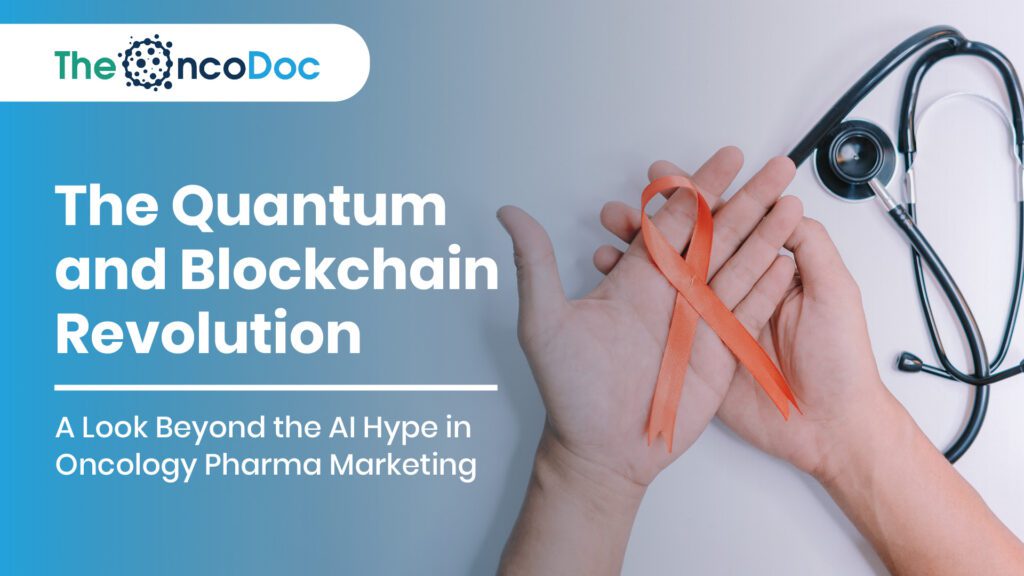Introduction: Moving Beyond the AI Obsession
Oncology pharma marketing has spent the past five years basking in the glow of artificial intelligence. AI has undoubtedly brought personalization, predictive analytics, and deeper insights to cancer awareness and treatment campaigns. Yet, as AI matures, two disruptive forces, quantum computing and blockchain, are quietly reshaping the future of oncology marketing.
Quantum computing promises unparalleled speed in analyzing complex genomic and clinical data, while blockchain offers trust, transparency, and security in an era of rising patient skepticism. Together, they redefine how oncology pharma companies build credibility, optimize campaigns, and engage patients, physicians, and policymakers.
This article explores transformative strategies, showing how quantum and blockchain will move oncology marketing “beyond the AI hype.”
1. Quantum-Accelerated Patient Segmentation
While traditional AI segments patients using demographics and online behavior, quantum computing takes precision to the next level. By analyzing multi-dimensional datasets, including genetics, lifestyle, medical history, and behavioral patterns, quantum computing enables marketers to understand patients at an unprecedented depth. This creates opportunities to design campaigns that are not just targeted, but hyper-personalized and predictive.
· Hyper-detailed segmentation highlights overlapping risk profiles, such as smokers with hereditary cancer markers, enabling early intervention campaigns.
· Marketing strategies can be tailored around polygenic risk scores, lifestyle habits, and local environmental factors, ensuring content resonates with individual patient realities.
· Quantum systems can model millions of “what-if” journeys, predicting how patients may respond to different screening nudges or treatment awareness programs, allowing pharma to deploy the most effective outreach strategies in real time.
2. Blockchain-Verified Oncology Campaigns
Patient mistrust in pharma messaging is a persistent challenge, especially in oncology, where misinformation spreads rapidly. Blockchain offers a powerful remedy by creating transparent, tamper-proof proof trails for every campaign. This not only safeguards authenticity but also positions pharma brands as trustworthy partners in cancer care.
· Every campaign message can be timestamped, validated, and stored on a blockchain ledger, eliminating the risk of alteration.
· Patients and caregivers gain confidence by verifying that information comes directly from certified oncologists or recognized institutions.
· This system also combats fake awareness ads or misleading miracle cure promotions, protecting brand credibility while reinforcing patient trust in evidence-based oncology communication.
3. Quantum for Drug-Treatment Matching in Marketing Narratives
Pharma companies often struggle to communicate drug efficacy without overwhelming jargon. Quantum simulations make it possible to model drug behavior at a molecular level. Marketers can:
- Showcase accurate “digital twin” models of how therapies work.
- Create visual narratives backed by quantum simulations.
- Build stronger oncologist and patient trust through science-backed storytelling.
4. Smart Contracts for Oncology Patient Support Programs
Blockchain-based smart contracts streamline patient support programs (PSPs).
- Automatic disbursement of co-pay assistance once treatment milestones are met.
- Transparent tracking of drug access initiatives.
- Increased patient trust through auditable, fraud-resistant systems.
5. Quantum-Driven Predictive Outreach
AI predicts likely cancer surges; quantum computing goes further by processing environmental, lifestyle, and genetic datasets simultaneously.
- Identify micro-communities with hidden cancer risk factors.
- Launch hyperlocal prevention campaigns before outbreaks occur.
- Reduce late-stage cancer burdens through pre-emptive education.

6. Blockchain to Combat Oncology Misinformation
Cancer misinformation spreads faster than awareness. Blockchain ensures content traceability.
- Verified survivor stories tagged with authenticity certificates.
- Real-time validation of oncologist quotes shared on social media.
- Reduction of fake “miracle cure” campaigns.
7. Quantum Optimization of Media Spend
Pharma marketers waste millions on low-return ads. Quantum algorithms can test billions of ad-budget permutations simultaneously to identify the most effective mix.
- Precision allocation across digital, print, and grassroots channels.
- Optimized targeting for rural vs. urban audiences.
- Measurable uplift in cost efficiency.
8. Blockchain-Led Transparency in Clinical Trial Awareness
Patients often distrust clinical trial marketing. Blockchain can store:
- Verified trial eligibility criteria.
- Transparent updates on trial status.
- Immutable records of patient consent.
This transparency encourages higher patient participation.

9. Quantum-Powered Emotional Analytics
AI analyzes sentiment; quantum computing models complex, overlapping emotions in larger populations.
- Campaigns fine-tuned for cultural, generational, and emotional nuance.
- More empathetic survivor storytelling.
- Marketing that connects with both patients and caregivers.
10. Blockchain-Enabled Pharma Reputation Systems
Pharma brands are under constant public scrutiny, and patients increasingly want transparent ways to assess credibility. Blockchain-enabled reputation systems offer a new model of trust.
· Patients and caregivers can rate oncology campaigns on decentralized platforms where reviews are immutable, ensuring accountability and preventing manipulation.
· Authentic campaigns stand out from promotional hype, as blockchain verification creates a clear record of which campaigns are patient-first and which are purely commercial.
· This approach builds lasting trust equity for pharma brands, positioning them as reliable partners in cancer care rather than just product promoters.
11. Quantum-Driven Real-Time Simulation of Awareness Impact
Measuring the effectiveness of oncology awareness campaigns has traditionally required weeks or months of waiting for data. Quantum computing changes this by enabling near-instant simulations of campaign outcomes.
· For example, a breast cancer screening campaign can be modeled to predict how uptake might shift within just three weeks of launch.
· Marketers can run best- and worst-case scenario models in real time, allowing them to pivot strategies quickly if initial results appear weak.
· This agile approach turns marketing into a proactive intervention, ensuring resources are invested in strategies with maximum potential for life-saving impact.
12. Blockchain for Survivor Clubs and Communities
Survivor clubs are powerful vehicles for peer-led awareness, but they depend on trust and authenticity. Blockchain ensures these communities remain safe and credible.
· Proof-of-survivorship credentials validate members’ experiences, eliminating risks of exploitation or false representation.
· Secure, blockchain-protected sharing of patient-generated data ensures privacy while allowing collective insights to inform supportive programs.
· With transparency and safety assured, survivor networks become more resilient, offering genuine spaces for healing, advocacy, and awareness-building.
13. Quantum-Powered Hyperlocal Oncology Campaigns
Quantum computing transforms how oncology marketers design precision campaigns by combining geospatial, genetic, and socioeconomic datasets to pinpoint micro-level cancer risk zones. This allows interventions to move beyond broad awareness into truly targeted prevention.
· Identify emerging oral cancer clusters in rural districts where tobacco use is high.
· Deploy vernacular campaigns, using local dialects, cultural references, and trusted community influencers for stronger resonance.
· Optimize resource allocation by focusing efforts where risk is greatest, ensuring higher impact and efficiency in awareness and screening outcomes.
14. Blockchain for Ethical Data Sharing
Patients fear their health data may be misused. Blockchain enables secure, consent-based data sharing.
- Patients decide who accesses their screening data.
- Transparent audit trails reassure participants.

15. Quantum-Supported Behavioral Nudges
Quantum models simulate millions of behavioral response scenarios.
- Predict which nudges, reminders, rewards, gamification, work best for different populations.
- Personalize nudges at scale with higher accuracy than AI alone.
16. Blockchain to Power Loyalty in Oncology Support
Pharma-led loyalty initiatives are evolving beyond discounts and basic reward systems. With blockchain integration, these programs gain both credibility and security, making patient engagement more meaningful.
· Patients participating in preventive screenings or check-ups can earn blockchain-verified health tokens, ensuring that every action is authentic and fraud-proof.
· These tokens can be seamlessly redeemed for valuable services such as nutrition kits, follow-up consultations, or subsidized diagnostic tests, reinforcing the importance of continuous health monitoring.
· Blockchain’s tamper-proof design prevents misuse of loyalty systems, ensuring transparency while simultaneously boosting long-term patient commitment to the brand.
17. Quantum-Backed Crisis Response Campaigns
In oncology, misinformation spreads quickly, whether about cancer vaccines, new therapies, or treatment side effects. Quantum simulations enable pharma companies to prepare and react with unmatched precision.
· Quantum models can process multiple panic-spread scenarios in real time, helping teams identify the fastest and most effective corrective strategies before misinformation escalates.
· This technology prioritizes communication channels, whether social media, WhatsApp groups, or community health centers, where patient fear is spreading most rapidly.
· As a result, oncology marketers can deploy targeted, evidence-based campaigns at critical moments, restoring trust and minimizing the long-term impact of misinformation.
18. Blockchain as Proof of Authentic KOL Partnerships
Key Opinion Leaders (KOLs) play a pivotal role in oncology marketing, but skepticism arises when partnerships appear commercially driven. Blockchain eliminates doubts by embedding transparency into every collaboration.
· Oncologist credentials and expertise can be securely stored and verified, ensuring only qualified experts endorse campaigns.
· Immutable blockchain records document the exact scope of each campaign association, leaving no room for hidden arrangements.
· Transparent payment disclosures further assure patients and caregivers that KOL recommendations are authentic, not transactional. This trust shift strengthens the influence of genuine KOL voices while protecting pharma brands from reputational risks tied to influencer skepticism.
19. Quantum-Optimized AR/VR Oncology Training
Quantum accelerates AR/VR cancer education by simulating complex tumor interactions.
- Richer immersive campaigns for oncologists.
- More compelling patient education.
20. Blockchain in Rural Oncology Campaigns
Blockchain enables offline-to-online trust bridges in rural India and Africa.
- QR-coded posters linked to blockchain-certified cancer content.
- Survivors’ voices preserved digitally, unaltered.
- Local credibility backed by global validation.
21. Quantum Forecasting of Post-Treatment Needs
Quantum computing is opening new frontiers in survivorship care by predicting not just immediate recovery but also the long-term needs of cancer survivors. This capability transforms oncology marketing from short-term treatment engagement into lifelong support ecosystems.
· By analyzing vast genomic, clinical, and lifestyle datasets, quantum systems can anticipate side effect trajectories years in advance, such as risks of neuropathy, fatigue, or metabolic disorders.
· Pharma companies can design and market holistic recovery programs, including nutritional plans, psychological counseling, and digital monitoring tools, tailored to individual survivor profiles.
· This future-facing insight positions pharma as a health partner beyond treatment, increasing brand trust and patient loyalty.
22. Blockchain for Oncology Supply Chain Transparency
Counterfeit and substandard cancer drugs are a critical global challenge, eroding both patient safety and trust in pharma. Blockchain offers a resilient solution by ensuring visibility and integrity across the oncology supply chain.
· End-to-end tracking, from raw material sourcing to pharmacy dispensing, guarantees that every step of a drug’s journey is recorded in a tamper-proof ledger.
· Patients and oncologists can directly verify authenticity through QR codes or blockchain-enabled apps, reducing anxiety over counterfeit products.
· Pharma marketers can leverage this transparency as a trust-building differentiator, turning drug safety into a key pillar of brand messaging and community confidence.
23. Quantum + Blockchain Synergy for Ethical Pharma Marketing
While each technology is powerful in isolation, the true disruption lies in their convergence. Quantum computing and blockchain together reshape oncology pharma marketing into a model centered on both speed and trust.
· Quantum computing delivers ultra-fast insights from genomic, behavioral, and market data, allowing campaigns to be predictive, personalized, and adaptive in real-time.
· Blockchain provides the ethical backbone with immutable verification, ensuring that content, claims, and partnerships are transparent and tamper-proof.
· Combined, they enable marketers to launch strategies that are not only technologically advanced but also demonstrably patient-first, aligning with global demands for ethical, impact-driven healthcare communication.
24. Future Outlook: Beyond the Hype
Artificial intelligence has defined the last chapter of oncology marketing, but the next decade belongs to deeper, more transformative technologies. Quantum and blockchain are set to shift the focus of the entire field.
· Trust over technology will dominate, with blockchain guaranteeing transparency in campaigns, drug supply, and patient interactions.
· Speed over speculation will drive success, as quantum computing ensures predictive accuracy in anticipating needs, risks, and market shifts.
· Patient-first over product-first will become the benchmark, where marketing success is measured not by ads delivered but by lives improved, screenings completed, and survivors supported.
Together, these forces will redefine oncology marketing into a discipline of speed, security, and societal impact.
Conclusion
Oncology pharma marketing is at the dawn of its post-AI era. Quantum computing and blockchain are not buzzwords; they are foundational technologies that will:
- Enable faster, more precise campaigns.
- Restore trust in a skeptical marketplace.
- Protect patient data while enhancing personalization.
- Build a future where oncology marketing is predictive, preventive, and patient-empowering.
Pharma companies that embrace this Quantum-Blockchain paradigm will not only outpace competitors but also redefine oncology engagement as a science of trust, speed, and human impact.
The Oncodoc team is a group of passionate healthcare and marketing professionals dedicated to delivering accurate, engaging, and impactful content. With expertise across medical research, digital strategy, and clinical communication, the team focuses on empowering healthcare professionals and patients alike. Through evidence-based insights and innovative storytelling, Hidoc aims to bridge the gap between medicine and digital engagement, promoting wellness and informed decision-making.



